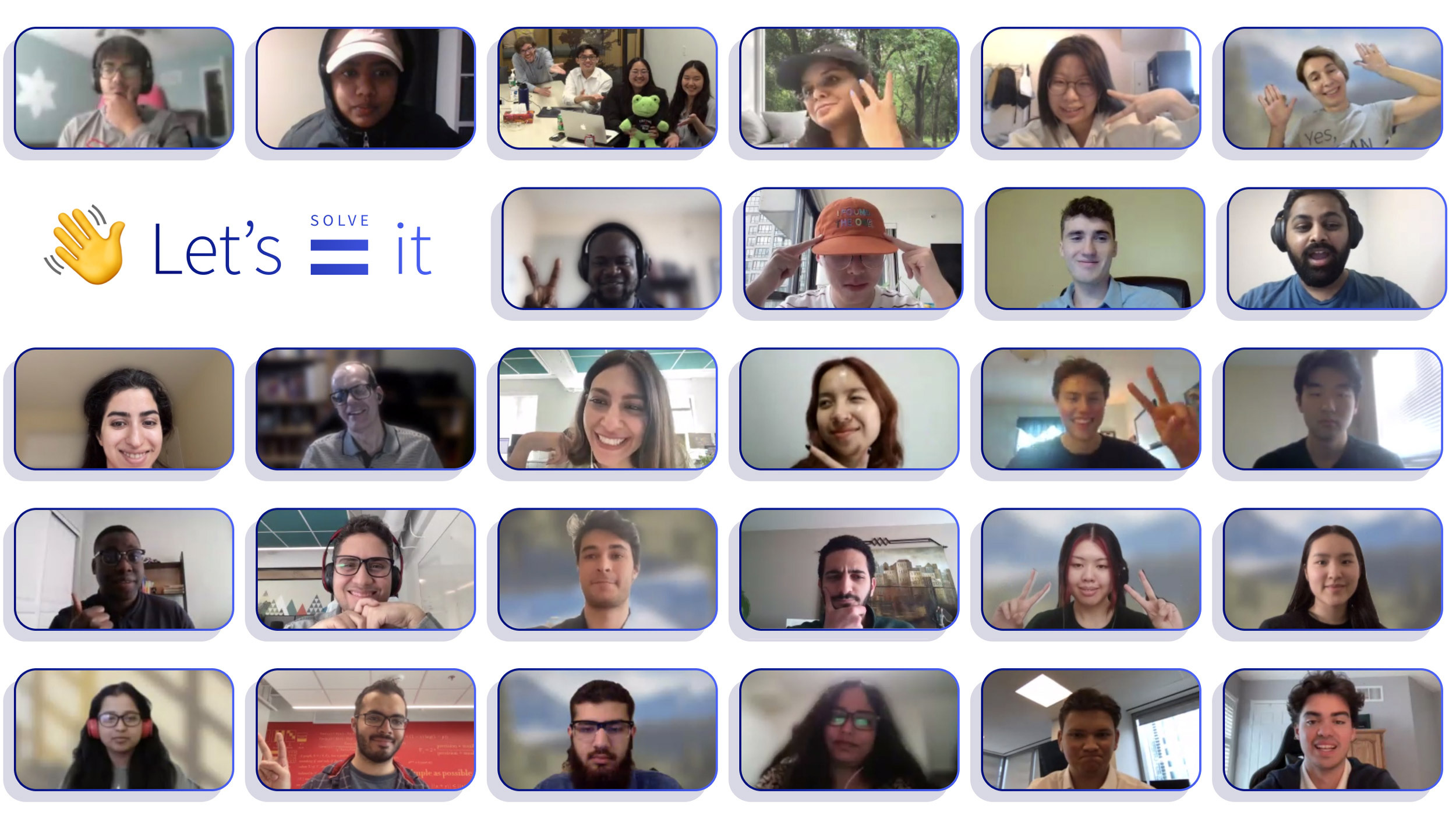
At RBC Borealis, we firmly believe that AI can be a force for good. We showed 30 mission-oriented students at Canadian universities how to use AI to make a positive impact on their communities. The ideas they developed were inspiring.
There’s been a lot of focus lately on the risks of AI. Yet AI is – on balance – a force for good. And at RBC Borealis, we are committed to advancing the pursuit of beneficial AI in our work, in our communities and in our ecosystems. So, we helped a diverse group of undergraduate students at universities across Canada harness the power of AI to solve specific challenges these students saw in their communities.
Over an eight-week mentorship and development program called Let’s SOLVE it, these undergraduate students worked with RBC Borealis researchers, engineers and product development specialists to design an AI-enabled solution and then create a proof of concept. They learned key AI skills and capabilities. They got experience with AI product development. They built a network of peers and future collaborators. And they used these skills to help solve important challenges.
“Let’s SOLVE it isn’t about delivering a single set of outcomes. It is about building a diverse AI talent pool with the skills, capabilities and inspiration to create positive and beneficial outcomes for their communities and society,”
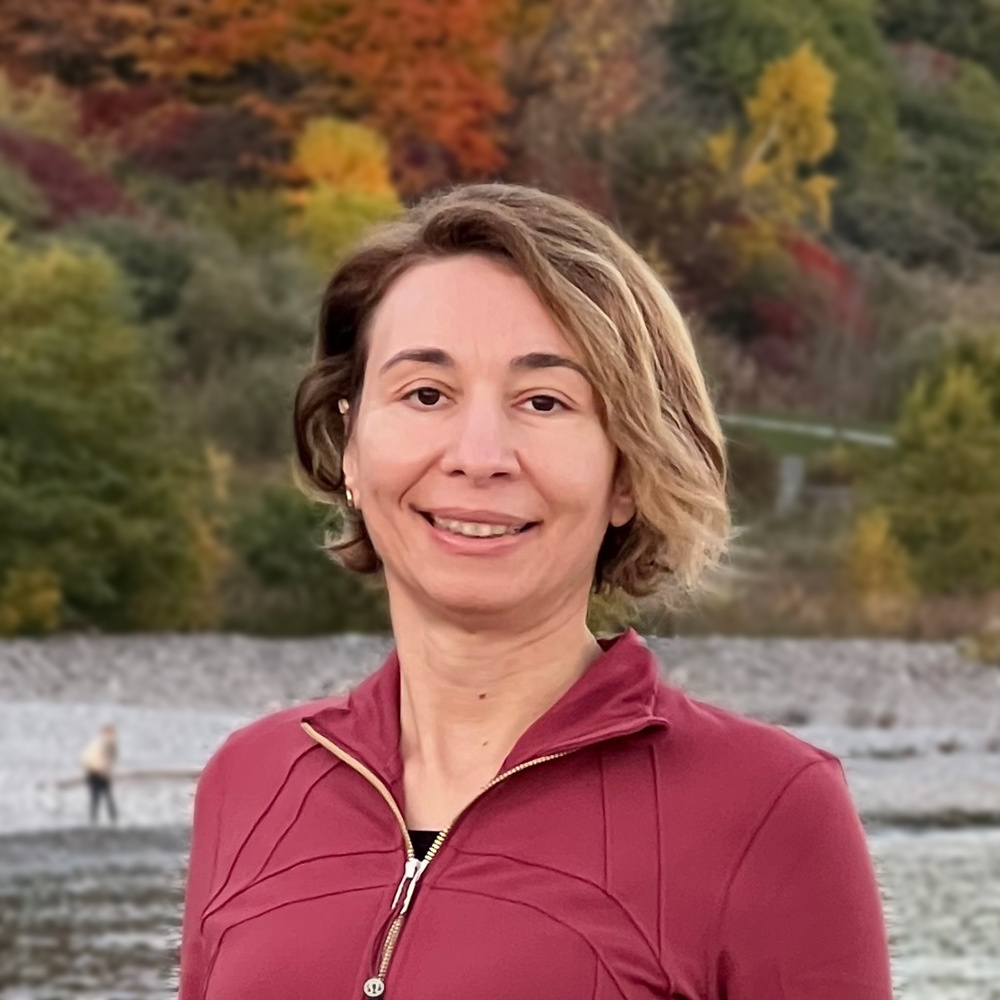
Dr. Eirene Seiradaki
Director of Research Partnerships
“By helping develop the next generation of talent early in their careers, we can shape the value and benefits that AI delivers to society.”
The 30 individuals are enrolled as undergraduates at universities across Canada. Nearly half of the participants identify as female. And they represent a wide range of educational disciplines, ranging from Computer Science to Biophysics and Organizational Studies. Working in small teams, the students identified the projects they wanted to work on based on challenges they saw in their local communities.
This session’s Let’s SOLVE it program graduates recently presented their ideas and work to an audience consisting of RBC Borealis leaders and team members from all functions and offices of the institute across Canada. Here’s a quick summary of the teams, the challenge they wanted to solve and their AI-enabled solutions.
Meet the Teams
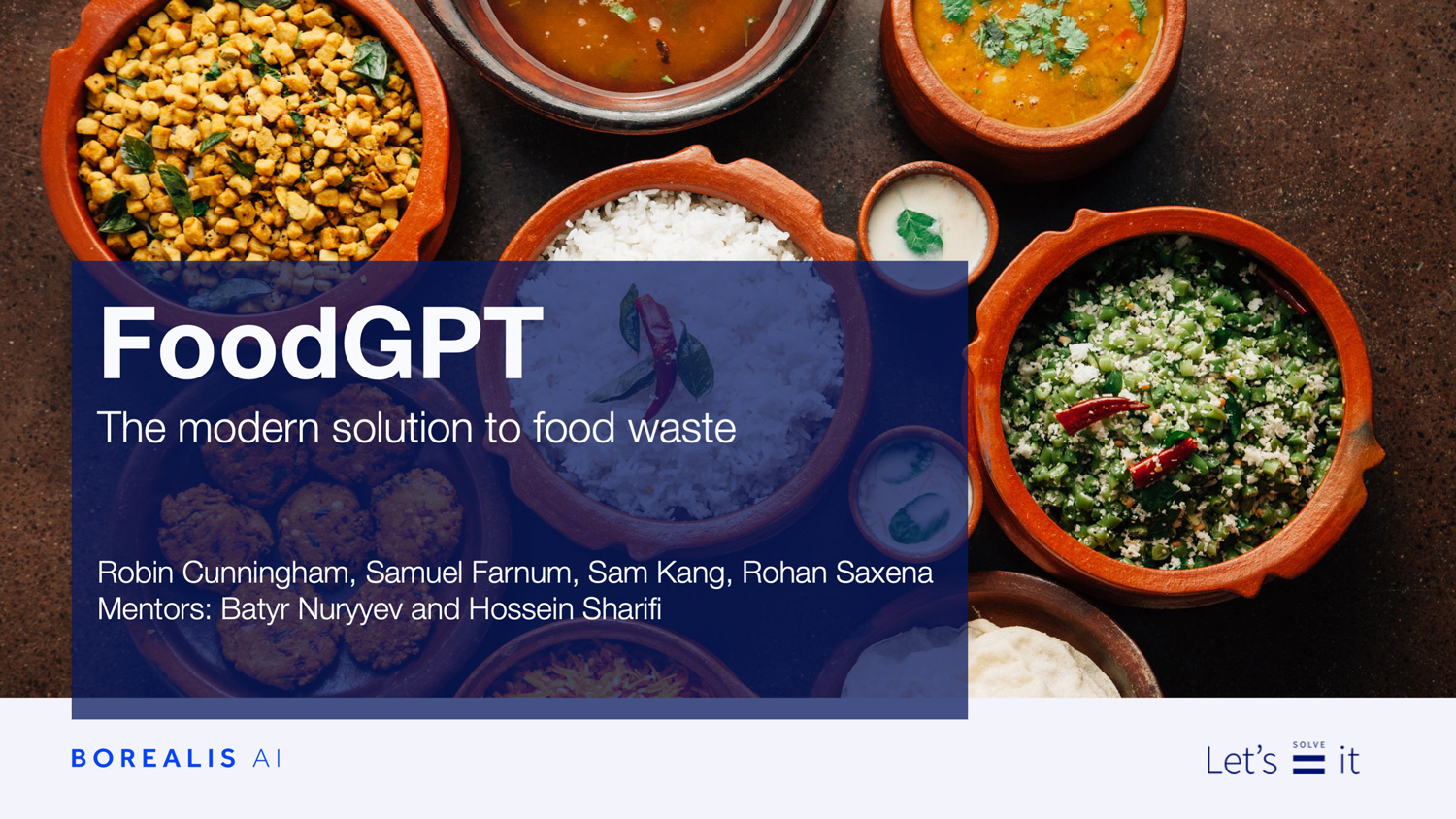
Team: FoodGPT
Members
Robin Cunningham, Samuel Farnum, Sam Kang, Rohan Saxena
Carleton University
University of Toronto
Mentor(s)
Batyr Nuryyev and Hossein Sharifi, RBC Borealis
Problem they wanted to solve
Reducing food waste. University students spend 37% of their income on food, but around half goes uneaten. The team wanted to see how they could use ML to help university students improve their cooking confidence, use leftover ingredients, and reduce food waste.
Let’s Solve it
The team created a cohesive machine learning model that combines multiple technologies to empower users with personalized recipes, reducing food waste and simplifying everyday tasks.
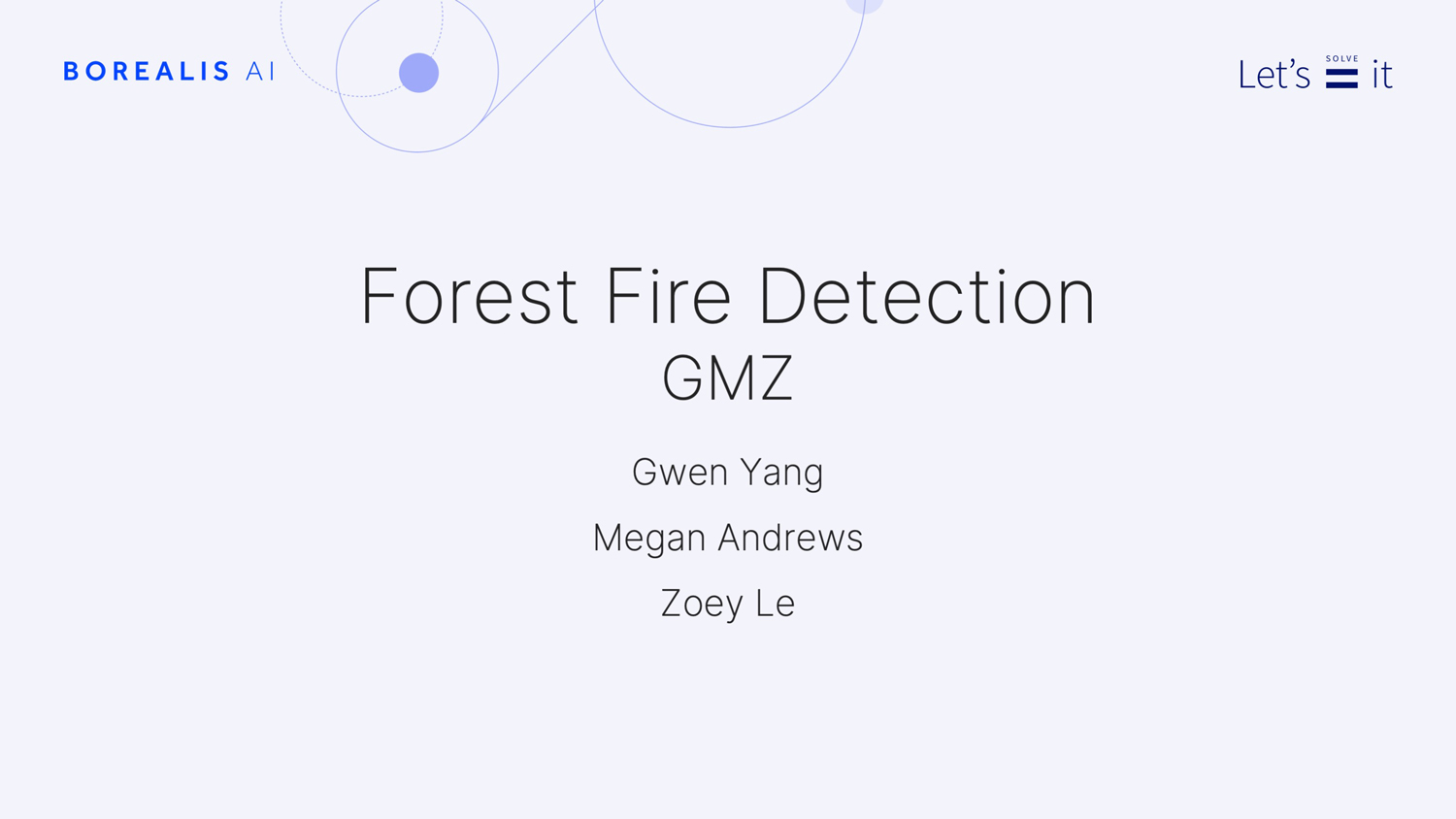
Team: GMZ
Members
Megan Andrews, Zoey Le, Gwen Yang
Simon Fraser University
Mentor(s)
Saghar Irandoust, RBC Borealis
Problem they wanted to solve
Detecting Forest fires. In a year of unprecedented forest fires, this team aimed to use AI and ML to detect fire and non-fire images and – ultimately – to help build a computer vision model that could accurately predict high-risk areas.
Let’s SOLVE it
The fire detection models the team created serve as a strong foundation for future predictive models by applying image segmentation techniques to detect high-risk vegetation features.
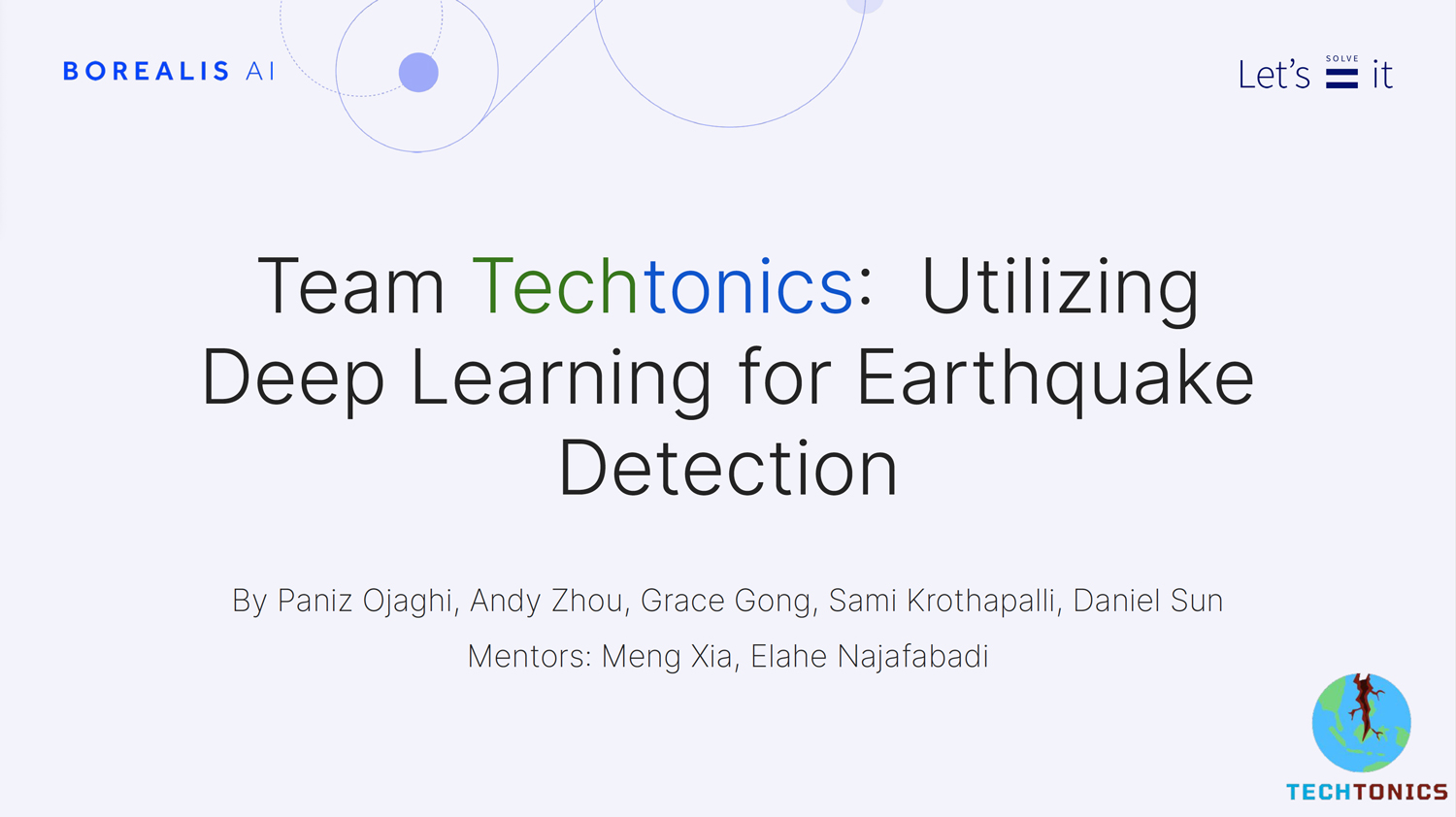
Team: Techtonics
Members
Grace Gong, Paniz Ojaghi, Sami Krothapalli, Daniel Sun, Andy Zhou
University of Western Ontario
University of Waterloo
University of Alberta
Mentor(s)
Elahe Najafabadi & Meng Xia, RBC Borealis
Problem they wanted to solve
Detect earthquakes faster. Over the years, the climate crisis has led to more extreme weather conditions, which can trigger earthquakes. Such intense activity puts stress on fault lines, leading to the occurrence of quakes. This team aimed to aid in the detection of earthquakes, support efforts towards mitigating their effects, and raise awareness about the importance of taking action to combat climate change.
Let’s SOLVE it
The team trained a convolutional neural network using over 100,000 seismic signal images to classify signals into ‘earthquake’ and ‘noise’ categories and to predict characteristics such as earthquake magnitude, earthquake p-wave arrival time, and earthquake s-wave arrival time.
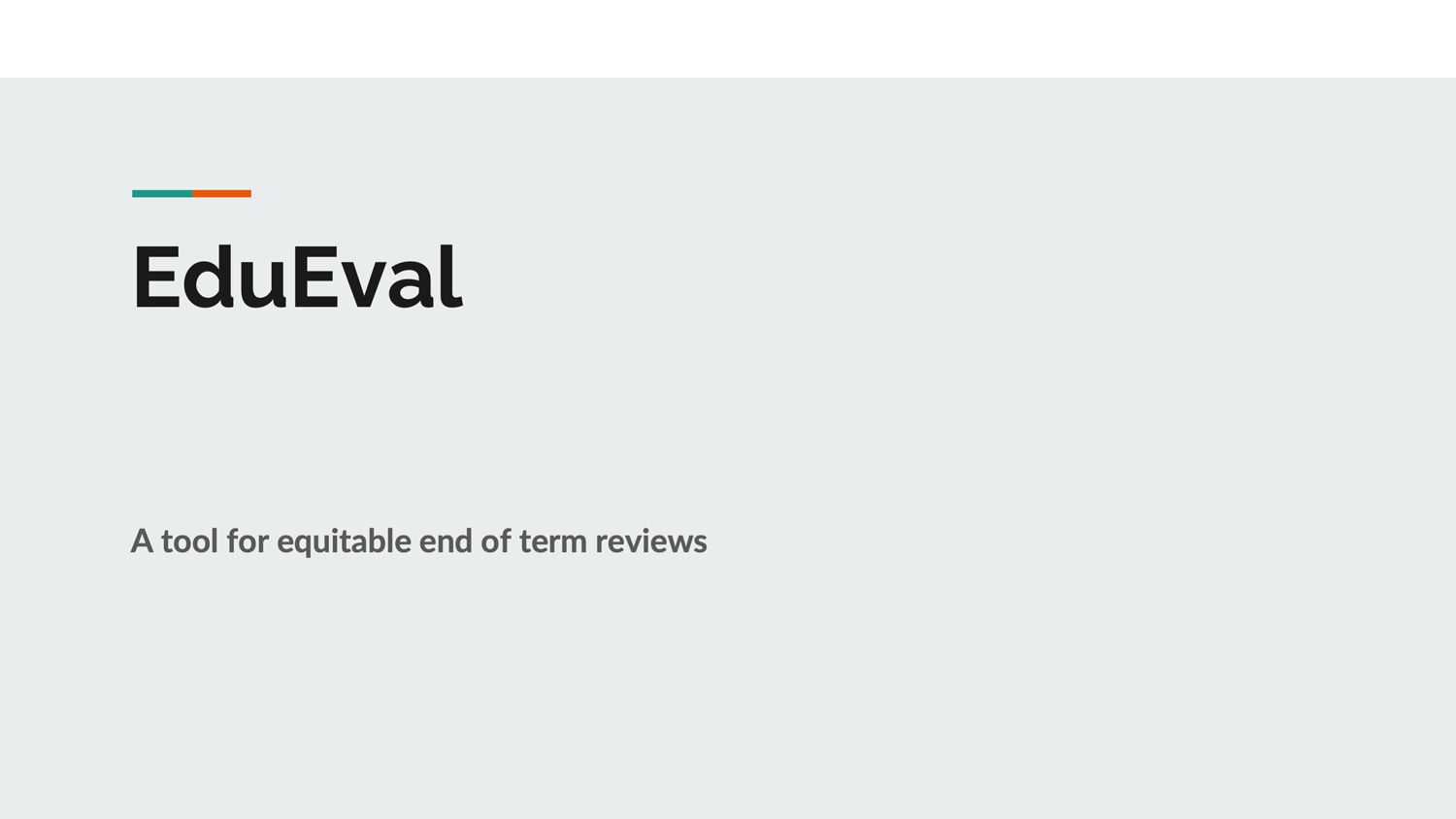
Team: QMAGS
Members
Matteo Golin, Hamnah Qureshi, Grant Achuzia, Jad Mohieldin
Carleton University
Mentor(s)
Khaled Ammar, RBC Borealis
Problem they wanted to solve
Enhancing end-of-term reviews. Professors and teaching assistants often struggle to absorb all the qualitative feedback they receive in end-of-term reviews. The team wanted to create a more equitable end-of-term review process where student voices are appropriately heard.
Let’s SOLVE it
The team created EduEval, a web application that allows users to browse summarized feedback via dropdown menus with positive and negative feedback shown side by side for comparison.
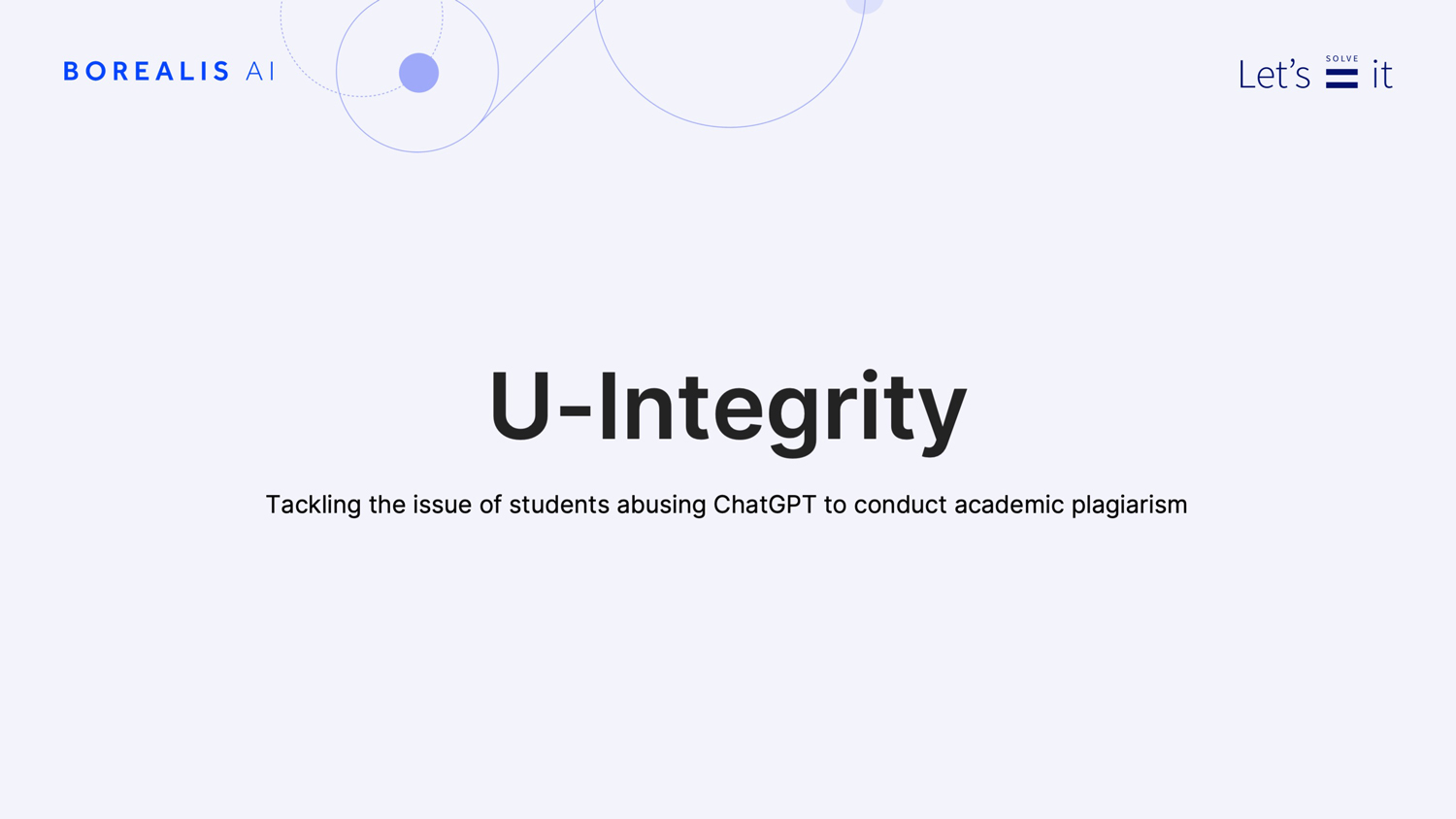
Team: U-Integrity
Members
Sharon Alex, Yuxin (Katy) Chen, Maliha Lodi, Omer Raza Khan, Sri Sai Pujitha Nallapati
University of Toronto
Mentors(s)
Taivanbat Badamdorj and Shilpa Singh, RBC Borealis
Problem they want to solve
Identifying ChatGPT plagiarism. With many students now using ChatGPT and other generative AI models to develop their assignments, this team wanted to use an ML model to compare the academic performance of students and ChatGPT using an automatic grader.
Let’s SOLVE it
Examining some 630 ChatGPT essays and 6,230 human essays, their model found that ChatGPT is capable of generating average essays and is less likely to produce very poor or great ones compared to human-written essays.
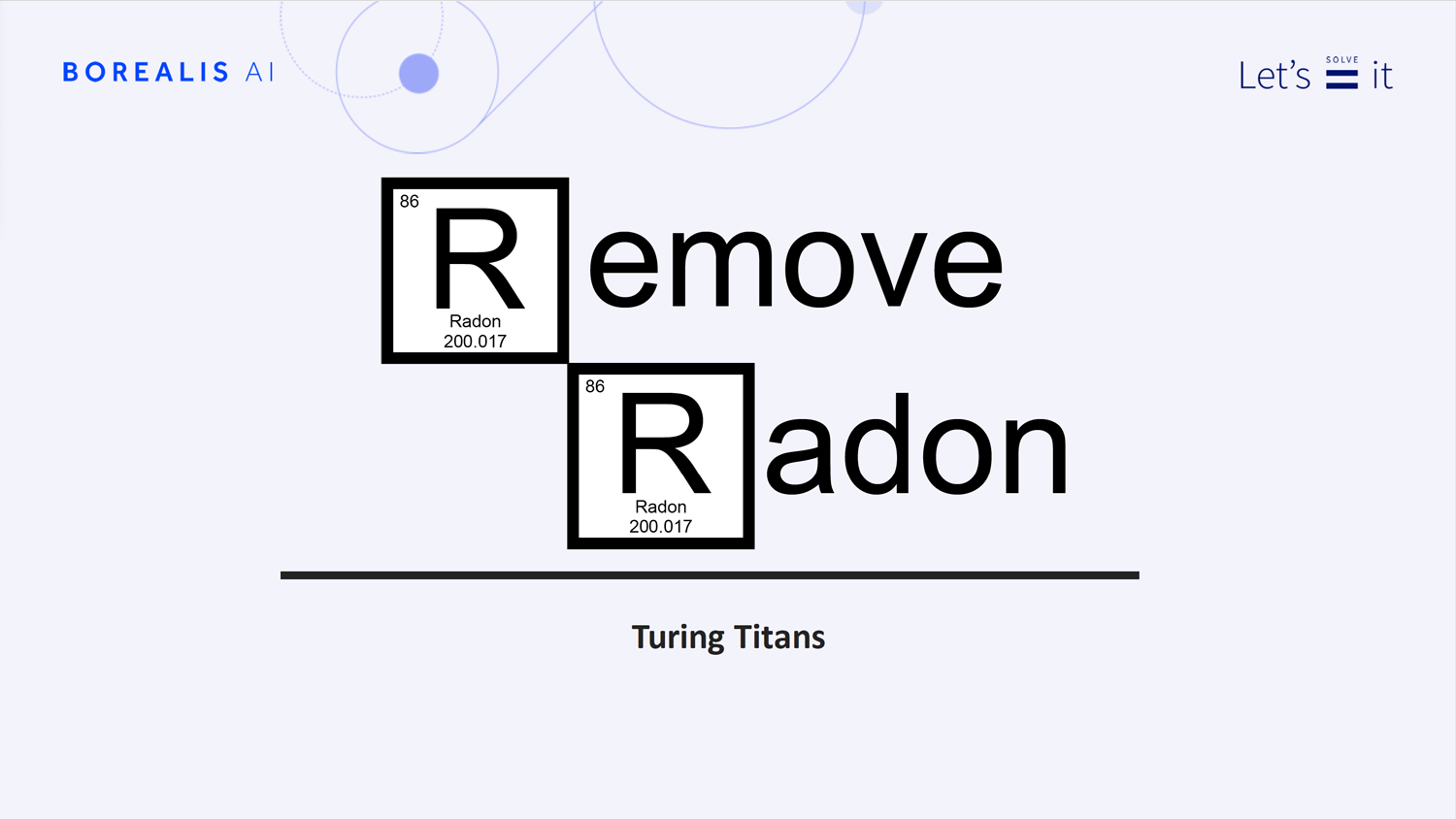
Team: Turing Titans
Members
Keegan Mongru, Rhys Dominguez, Cullen MacLeod, Julia Groza, Jack Peplinski
University of Western Ontario
Mentor(s)
Mayank Anand, RBC Borealis
Problem they wanted to solve
Detecting a silent killer. The WHO estimates 189,000 people die each year from preventable radon exposure, which accounts for 15% of lung cancer deaths. This team wanted to create a tool to help people assess their radon exposure and make those insights actionable.
Let’s SOLVE it
The team created an accurate model to predict radon concentrations based on a small set of variables commonly accessible to homeowners, which could eventually be connected to smart home products.
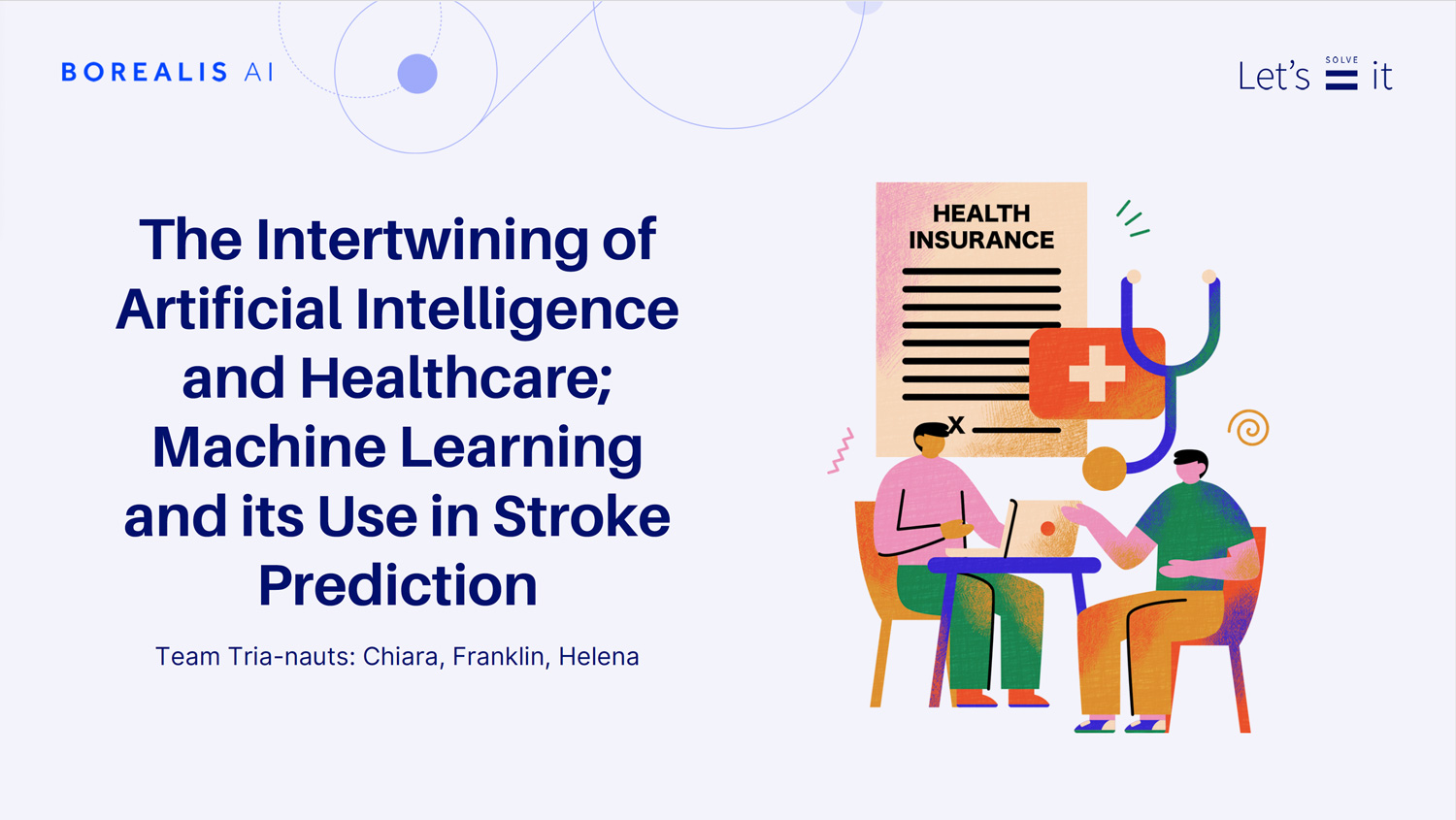
Team: Tri-nauts
Members
Chiara Alcantara, Franklin Ramirez, Helena Xu
University of Waterloo
Mentor(s)
Kevin Wilson, RBC Borealis and Philip Mathew MD, External Subject Matter Expert
Problem they want to solve
Predicting strokes. Strokes are the leading cause of disability and the second leading cause of death worldwide. Motivated by personal experiences, the team wanted to use AI and ML on health datasets to develop an accurate stroke predictor calculator.
Let’s SOLVE it
Using the 430,000 survey responses in the US CDC BRFSS dataset, the team created a calculator that uses ML to predict if an individual is at risk of a stroke, to an accuracy of around 93%.
“The Let’s SOLVE it program delivers massive value – it helps train tomorrow’s AI leaders, it encourages diversity in our talent pipeline, and it helps create new ideas and solutions to some of the challenges facing communities today,” added Dr. Eirene Seiradaki.
“We are excited to see what the Fall 2023 Class of the Let’s SOLVE it program will do next. And we look forward to welcoming the next cohort of students to the program very soon.”
Applications for the Let’s SOLVE it Fall 2023 cycle are now open!
If you are an undergraduate student who dreams of pioneering the next game-changing community solution using AI and ML, we want to help you. We are seeking teams of 3 to 5 undergraduate students from all over Canada to participate in a free two-month remote mentorship program. Let’s SOLVE it offers the chance to collaborate with experienced Machine Learning Researchers and Engineers, gain industry exposure, receive technical guidance, and build valuable connections.
🗓 The deadline to submit your team application is September 10, 2023.
About Let’s Solve it
Let’s SOLVE it is one of a handful of initiatives that RBC Borealis and RBC support, to encourage diversity, skills development, and innovation in Machine Learning (ML) at Canadian universities. Along with initiatives like our RBC Borealis Fellowships program (aimed at Ph.D. students) and our Internships program (focused on post-grad-level students), our goal is to help nurture the AI leaders of tomorrow. The mentorship program was also recently showcased during a D&I Social event at the IEEE/CVF Conference on Computer Vision and Pattern Recognition (CVPR), the premier annual computer vision event. Let’s SOLVE it is among other initiatives that support underrepresented groups in AI and promote AI for social good.